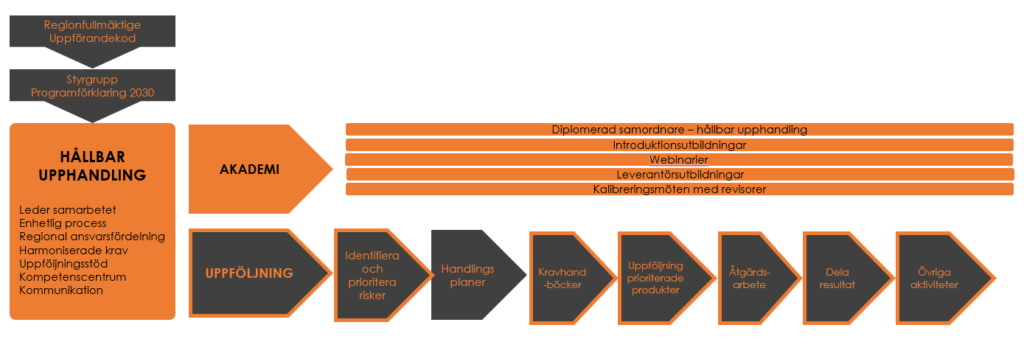1. Updated Operational Focus – Monitoring, Competence Development, and Communication
Based on the previously adopted Programme Declaration and to realise the 2022–2025 vision, contract monitoring, competence development, and communication are considered the strategically most important activities.
Monitoring compliance with sustainability requirements is crucial to ensure that procured goods and services meet the established standards, maintain fair treatment, and prevent market distortions. However, contract monitoring remains an underdeveloped area (SOU 2013:12, OECD 2020), and national coordination increases the number of follow-ups conducted each year. Harmonised requirements are a prerequisite, including environmental standards in addition to supply chain sustainability criteria. A national system support tool has been procured and is managed by the Secretariat to streamline the process.
Sustainable procurement requires expertise and knowledge to perform tasks in accordance with political decisions, current legislation, and in an efficient and strategic manner
(External lnk).
National coordination of training for procurement and sustainability departments is more effective and contributes to higher goal achievement.
The results and value of national coordination, as well as each region’s achievements, must be communicated clearly. The Secretariat plays a central role in supporting strategic communication and spreading knowledge that demonstrates the value created.
Proposed Focus Areas and Goals: (in swedish)

1.1 Coordinated Contract Monitoring
1.1.1 Harmonised sustainability requirements are essential for joint follow-ups
Harmonising sustainability requirements is a prerequisite for conducting coordinated follow-ups. In addition to aligning requirements for sustainable supply chains, environmental requirements must also be harmonised. In the 2022–2025 three-year action plans, environmental requirements focusing on climate and chemicals are identified and harmonised for selected products, and all regions incorporate these common requirements when establishing new contracts.
1.1.2 National System Support and More Effective Selection Methods
To streamline operations and enable a higher number of follow-ups, a system support tool for contract monitoring has been procured. The system will be administered by the regions’ Secretariat.
Goals:
• The long-term goal is to ensure compliance with sustainability requirements and contribute to sustainable development and Agenda 2030.
• Increase the quality of follow-ups.
• Increase the number of follow-ups conducted.
• Increase the number of self-assessment evaluations.
• Systematically and accurately select the suppliers that the regions will follow up.
• Increase the number of office/factory audits conducted by the regions.
1.2 Competence Development
Reports and studies show a continued need for support in procurement practices that contribute to Agenda 2030 (OECD 2020, Integrating Responsible Business Conduct in Public Procurement). Increased focus on competence development improves the quality of sustainable procurement and helps organisations achieve their goals.
Although many training activities already exist within the collaboration, they need to be strengthened and systematised. The Secretariat therefore recommends establishing an “Academy for Sustainable Procurement.”
Goals:
• In 2022, develop a programme for Certified Coordinators – Sustainable Procurement (including two audits, e-learning, and introductory training). In 2022, eight regional coordinators should be certified, with numbers increasing in subsequent years.
• Administer and deliver two internal introductory trainings on sustainable procurement.
• Administer and deliver four webinars per year on current topics.
• Administer and deliver two supplier trainings per year.
• Administer and conduct annual auditor calibration.
• Offer all new network members a short introductory training.
• Ensure the Secretariat maintains high expertise in priority risk areas.
• The Secretariat will provide ongoing monitoring of developments in priority risk areas.
1.3 Communication
Sweden’s regions are politically governed organisations, with elected officials ultimately responsible for decisions that guide operations. Political decisions must be based on facts and knowledge. The Secretariat has a central role in disseminating knowledge to regional politicians and officials, demonstrating the value and success factors of systematic national sustainable procurement work. This includes openly and transparently communicating results to the public. This ensures sustainable procurement is integrated into political decisions, policies, and budgeting processes.
Significant internal and external communication is already underway but needs to be systematised and strengthened.
Goals:
• Increase the number of news items via web and social media.
• Provide newsletters with current updates.
• Increase web traffic.
• Enhance monitoring per risk area.
• Broaden dissemination of results from follow-ups conducted.